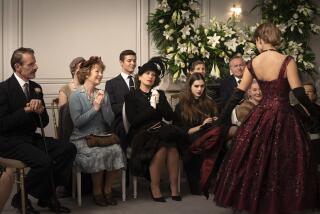MOVIE REVIEW : Adlon’s ‘Rosalie’ Shops Until She Drops
- Share via
When Rosalie Greenspace goes shopping in “Rosalie Goes Shopping” (AMC Century 14), a beatific smile covers her face and her grand torso goes golden. Rosalie--latest creation of the classy team of director Percy Adlon and actress Marianne Sagebrecht--is an ex-Bavarian postwar bride, living with a huge brood in Stuttgart, Ark. She’s also an emigre addicted to credit, a terrific comic obsessive. Around her, Adlon weaves a movie full of candied visions, steely satiric truths.
For Rosalie, shopping may be better than sex or love. When she skips it, she feels she’s committed a sin, one more thing to confess to the weedy local priest (Judge Reinhold) at the Sacred Heart of the Prairie Church. But this golly-gee father is more concerned about her other crimes: the bank finaglings and bounced checks by which she keeps her husband--crop-dusting pilot Ray (Brad Davis)--and her family in precarious comfort.
Adlon’s “Rosalie Goes Shopping” is a farce about a family gone loony over Life on the Installment Plan. You’d expect a satire on this subject to have the ferocity of “War of the Roses” or “Raising Arizona.” But, instead, it’s a weirdly amiable sendup. It puts us in a sunny little trance, buoyed up by the bubbly syncopations of Bob Telson’s musical score, eased by the playful pastel colors, soothed by its charming nuttiness. When Adlon shows the Greenspaces watching tapes of their favorite TV commercials, happily reciting the “sell” lines in chorus, he doesn’t savage them. He seems delighted by their boundless, sweet idiocy.
“Rosalie” might have been a modern version of “You Can’t Take It With You,” but there’s a catch: The Greenspaces probably do want to take it with them. They’re obsessive materialists. They’re also Rosalie’s darlings, with gooey pet names like Schatzi and Schnucki. They call their demented dad “Liebling.”
The main family obsession replicates the craziness of modern society. Rosalie--juggling 37 credit cards, loans and mortgages with fiendish cunning, altering checks, rifling her son’s bank account--insists she’s only doing what the government and banks want her to. It’s her equanimity in the face of escalating crises that makes her attractive. “Capital that isn’t being used is a dead duck,” she tells her flabbergasted father confessor, and, for the next hour, duck honks resound on the sound track, mingling with Telson’s puckish country-Western anthem “Lord, Won’t You Give Me Just a Little More Credit?”
Adlon has a bizarrely off-center comic sense and, just as in his two previous Sagebrecht films, he uses color to key his world. “Sugar Baby” was bathed in hot pinks, “Bagdad Cafe” in desert golds and yellows. Here, Adlon uses blues for the Greenspaces clothes, the Stuttgart silos and hangars, even the Little Rock bank that holds the key to the Greenspaces’ fate. Sometimes it seems nearly everything is blue but the sky, which Adlon, occasionally, puckishly covers with orange and red filters.
“Rosalie” doesn’t have the luminous pop perfection of Adlon’s surprise hit, “Bagdad Cafe.” The dialogue--Americanized by Christopher Doherty from Adlon and wife Eleonore’s script--doesn’t play as well this time, coming from middle-class climbers instead of “Bagdad’s” desert eccentrics. But Adlon again works wonders with his idiosyncratic cast.
At the center of the delightful ensemble is the super- saftig Sagebrecht. And, though she may be a nightmare movie idol for a diet-crazy nation, she’s a towering camera subject. The others are mostly wonderful as well: Davis, Reinhold, Courtney Kraus, Alex Winter, Patricia Zehentmayr--and especially Erika Blumberger and Willy Harlander as Rosalie’s parents.
There’s a real stinger inside “Rosalie Goes Shopping” (rated PG, despite some implied sex) and the audiences in a country that has, in less than a decade, gone from the world’s greatest creditor nation to its greatest debtor, would do well to heed it. “Rosalie” suggests that credit-crazed America is on a manic-depressive binge: soaring when the goodies arrive, crashing when the bill falls due. But Adlon doesn’t force the point. His gentle, easy texture soaks up the acid undercurrents.
Adlon isn’t trying to punch the audience into a state of awareness. He wants us to achieve awareness, as Rosalie achieves her shopping raptures. In this oddball mix of bliss and pragmatism, true-blue Americanism and Teutonic sentimentality, the movie keeps a giddy balance, like a comic gyroscope perched on a sunbeam. The opera ain’t over until the fat lady sings--and, in this case, Adlon and his mountainous, magnificent diva, Sagebrecht, give us a sumptuous last comic aria.
More to Read
Only good movies
Get the Indie Focus newsletter, Mark Olsen's weekly guide to the world of cinema.
You may occasionally receive promotional content from the Los Angeles Times.









